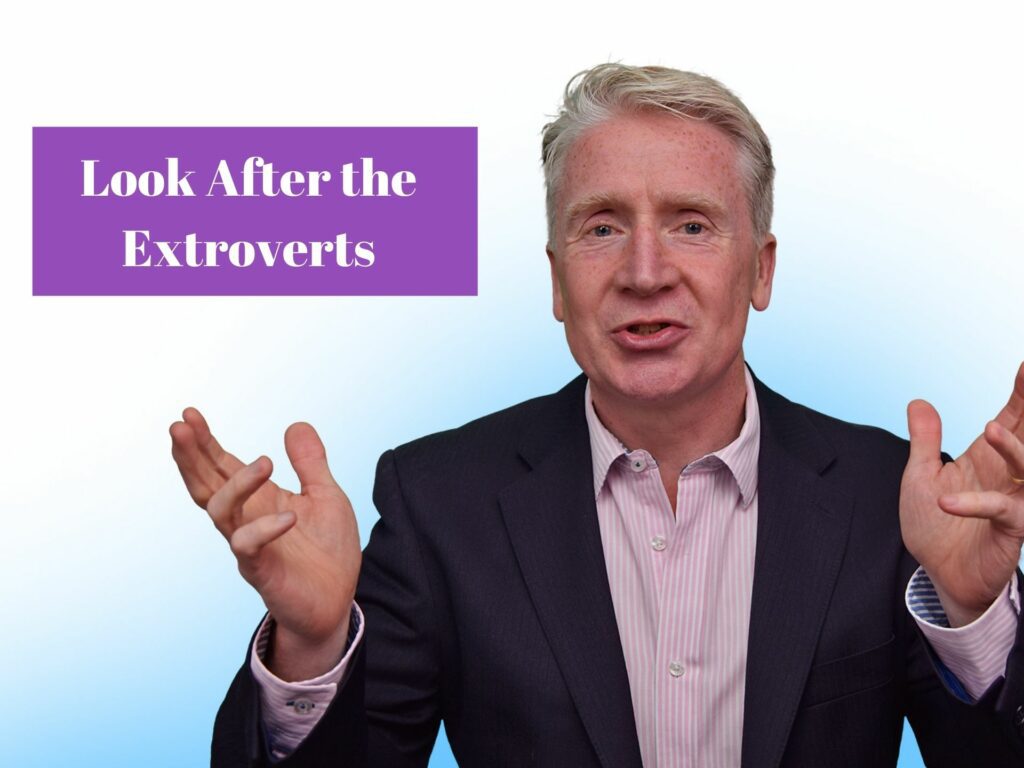
Look After the Extroverts
Many extroverts are the big noise and the big characters on a night out, but can often be the most fragile underneath. People suffering from mental health issues be they extroverts or introverts are often experts at concealing the challenges they’re facing from their nearest and dearest. Please, please, please ask better questions and challenge each other. If something doesn’t feel right, smell right, or seem right, then it’s your responsibility as a human being, a friend, a lover or a stranger to ask a better question, and not let it go.
Reading time approximately 2.5 mins.
Look After the Extroverts
Who enjoys isolation more? The introvert or the extrovert? Or is it the ambivert? We all have our personal coping mechanisms for dealing with isolation, some more successfully than others. In general, the extrovert is somebody who craves sociable environments and the interaction of others around them. They feed on the noise and the energy that comes from being in the thick of the action, talking and laughing be that in a pub or a restaurant.
By contrast, the introvert tends to enjoys their personal space, their solitude, their sanctuary and peace and quiet. It could be said that during COVID times the introvert has potentially handled things better, they’ve suffered less because they enjoy their solitude and their space without interruption or having to go to events and make small talk with strangers. With Zoom and Teams, they’re able to be themselves and can turn the camera off when they want to.
This makes introverts sound like they’re really quite unsociable and stand-offish, which isn’t intended. Something regularly said by extrovert about introverts’ is that it’s so difficult to communicate with them, they hardly speak, don’t say what they mean and we don’t know what is going on inside their heads. An introvert might counter with the extrovert’s inability to stop talking and allow them a window of opportunity to speak, so they don’t bother trying. It’s all sounding a little bit childish and petulant, but broadly that’s how it works. One is too loud for the other. The other is not loud enough.
For me, the ambivert definition is someone who takes the middle ground and adapts to their surroundings. I’ve always described myself as a chameleon. Not a comedian, a chameleon! That means I will turn up the energy, the volume and the performance in specific environments, while more often than not craving some peace and quiet. I adapt to my surroundings, changing to fit in, to hide or to stand out, just as a chameleon does.
I think of this as a scale of 1-10 where introvert is a one, extrovert a ten and the ambivert sits somewhere in the middle. Dependent upon the situation, the day of the week, your star sign, who you are with, you will score yourself differently. Under the effects of isolation, be that forced or chosen, the extreme edges of that scale are where I am most concerned. Some people have thrived under isolation, have worked very hard, excelled in all they do, and achieved many successes. The flipside is the others, the social beings, who are so used to being involved with things the whole time, being the centre of attention, yet with the volume turned to mute they have suffered and struggled immensely.
Your challenge today and over the next few weeks is to look after the extroverts, check in on them, find out how they are coping with this new world we are currently living in and talk to them. Make sure that they are seeking out help and are being as sociable as they can be. Because when an extrovert becomes extra quiet and retreats into themselves, that’s a different situation entirely. We need to ask better questions and make sure that if our gut feel tells us something isn’t quite right, it’s our responsibility as human beings to follow up. Send them a message, give them a call, be proactive and get in touch. One act alone can change a life or even save one.

